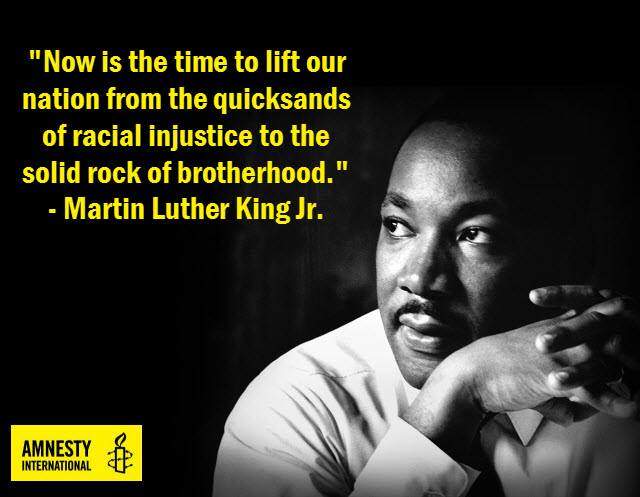
By Thenjiwe McHarris, Senior Campaigner at Amnesty International
On August 28, 2013, thousands upon thousands of people gathered on the 50th anniversary of the historic March on Washington. As we gather as a community and as a nation to honor the legacy of Dr. Martin Luther King Jr. and remember his courageous I Have A Dream speech, we are compelled to not only think of the progress made over the past 50 years, but also just how much of his dream has yet to be truly fulfilled.
In a time where racial profiling by law enforcement has become a social norm and many young people of color are forced to learn what it means to be criminalized in the 21st century, we must remember that to truly honor Dr. King, we must continue the struggle for justice.
As a child of the Bronx, raised understanding the ramifications of being born black, watching many young black and brown children fall victim to a policing tactic that relied solely on the color of their skin rather than their actions, I am compelled as an organizer, as a human rights activist and as a sister to continue what Martin Luther King Jr. and so many others started 50 years ago. Only in doing this, will I be honoring his memory, his legacy and his sacrifice.
I join others in calling on President Barack Obama to honor Martin Luther King Jr. and so many other civil and human rights leaders of our past by taking concrete steps to make his dream real, by helping to end the practice of racial profiling in the United States.
The United States cannot and should not tolerate practices and policies that create fear and mistrust between individuals or communities and those who are charged with the duty of protecting them.
I join others in calling on President Obama to not only support, but do everything in his power as President of the United States to ensure Congress passes the End Racial Profiling Act of 2013 (ERPA).
EPRA would prohibit all law enforcement agents at state, federal, local and tribal level from stopping, investigating or detaining an individual based on his or her race, ethnicity, religion or national origin. It would also require law enforcement agencies, which receive federal grants, to institute specific policies to eliminate racial profiling.
Passing and implementing ERPA would be a significant step toward helping the United States uphold its duty to respect, protect and fulfill the rights of all people. As we commemorate the 50th anniversary of the historic March on Washington, I urge the President to speak more than words and honor Dr. King by taking concrete action, so that all children, no matter the color of their skin, are treated with dignity and respect.
